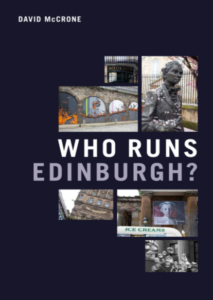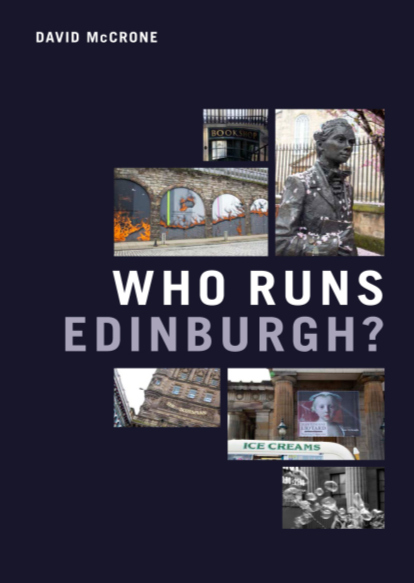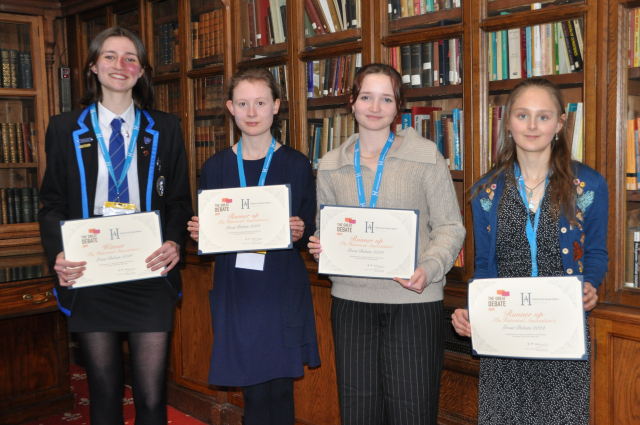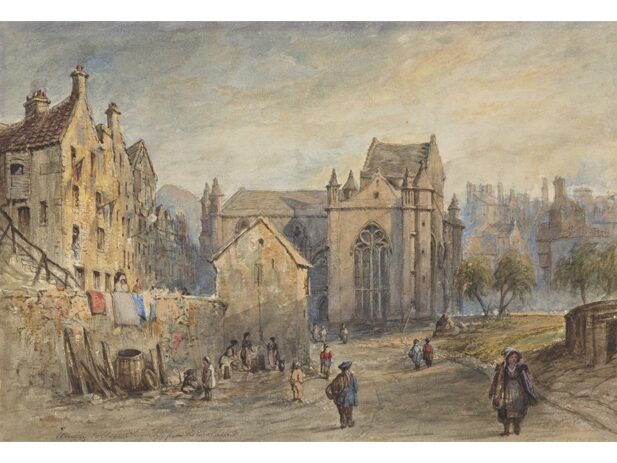 Why ask who runs any city these days?
Why ask who runs any city these days?
The conventional wisdom is that cities have been hollowed out by global economic forces, that they are nowadays only interesting because of that process. If cities were once places of considerable power, they are no longer. Yet all is not what it seems. Studies of local power matter, otherwise cities would all be, and indeed look, the same; and patently they are not. Then there is people’s attachment to places, that they feel they belong to somewhere. Glasgow is not the only city where people think that their city belongs to them.
Edinburgh is a small city, of half a million people, small in proportional terms – less than 10% of Scotland’s population. Dublin has about a quarter of Ireland’s. Edinburgh is also a national capital so it accommodates national agencies. While Edinburgh receives national financial support for its duties as a capital city, there are tensions, most notably over tourist footfall. Think of Scottish Government’s reluctance to allow Edinburgh a ‘bed tax’.
Consider a city as an ‘ecology of games’: politics, banking, the media, churches, schools and colleges, civic groups, each with its own set of rules and goals in which the participants know the score. People go about their business playing their own games according to the rules, more or less. It suits those who report on these games, notably the media, who have their own games to play, to finger winners and losers, and to translate the game for the spectators accordingly. It is handy for them to construe an identifiable ‘they’ because it makes life, and explanation of outcomes, simpler. Back in the mid-19th century, journalist John Heiton described Edinburgh as a ‘city of castes’; the description has stuck.
When I came to Edinburgh as a student in the late 1960s, having been born and brought up in Aberdeen, I wondered what I had come to. I was frequently asked what school I had been to. What they wanted to know was what social tribe I belonged to: was I a Herioter, a Watsonian, an Academical and so on. Outsiders like me felt that there was something intriguing and unknown about our adopted city; we know, though, that we didn’t quite ‘belong’.
 So how to tackle the question: who runs Edinburgh? Manifestly, there is formal party politics. Who runs this city? What sorts of people govern the place? How are economic interests represented on the council? For a century or more, down to the 1970s, it was governed by the self-styled Progressives. They built the city as we know it, laid out its housing and its class system literally on the ground. They represented small and local capital and took the view that ‘politics’ had very little to do with running the city; until it most obviously was.
So how to tackle the question: who runs Edinburgh? Manifestly, there is formal party politics. Who runs this city? What sorts of people govern the place? How are economic interests represented on the council? For a century or more, down to the 1970s, it was governed by the self-styled Progressives. They built the city as we know it, laid out its housing and its class system literally on the ground. They represented small and local capital and took the view that ‘politics’ had very little to do with running the city; until it most obviously was.
We cannot avoid giving an account of money and economy, how material interests are translated into political ones. Edinburgh was not defined by a single industry, unlike Glasgow (shipbuilding), Manchester (cotton), Birmingham (engineering) or Sheffield (steel). A process of reinvention took place in Edinburgh, with a complex service economy, and a cultural history to exploit. The lack of industrial dominance meant that transition to a cultural economy was much smoother than it might have been, taking on a seamless quality, and with it, continuities of economic power.
What’s living in Edinburgh like? We sense that we are still in a world of elites, who inhabit shady social worlds, based indubitably on wealth, but discreetly manifest, underplayed and often unspoken. This is the world of clubs, associations which you don’t join without an invitation. The Merchant Company is one such, which has direct connections into certain schools and professions. Start a conversation about who runs Edinburgh, and it is likely you will be told about the New Club on Princes Street, hard to find but key to accounts of power in Edinburgh.
Can we identify a social-political caste who hold power, or is it nowadays a function of technocratic structures and financial sleights of hand? Could it be that no-one actually runs the city, but that a series of complex games with their inner logics, political, economic, cultural, keep the show on the road? We live in a world of ‘new public management’, rife in governments, cities, institutions; to its critics, the cost of everything and the value of nothing, as Oscar Wilde famously said.
If we cannot put our finger neatly on the complex of elites anymore, that is because power in the city has been transformed. It is not the case that no-one runs the city, but that systems of power, economic, political and cultural, are manifestly no longer local. The hands of central government and of global capital are all too obvious in how Edinburgh works.
If the city is not quite run by algorithms, then a framework of external rules sets the parameters for decisions to be taken. Those who pay the piper certainly call the tunes. The other side, however, is that in a relatively small and self-contained city of half-a-million people, there are those and such as those. Scale is important because it is easier to get to know people ‘like yourself’. Indeed, they probably already do, for they will have attended the same schools, joined the same clubs, and engaged in similar pursuits, whether golf, archery, and above all, dining, which isn’t much about eating and far more about influencing.
The myth – in the sense of a truth held to be self-evident – that Edinburgh is a city of castes dies hard. You only have to live in the city to know that not everything meets the eye. And you end up, like the author, asking: what kind of place is this? Read the book and see if you agree with my answer.
By David McCrone
Who Runs Edinburgh? by David McCrone (pictured above top left) was published on 31 October 2022 by Edinburgh University Press at £14.99 paperback.
Members of the Old Edinburgh Club were offered 30% off the purchase price from Edinburgh University Press.




